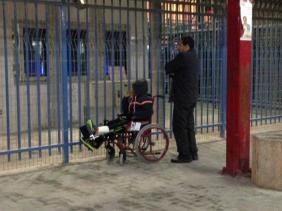Qalandiya
05:00 There wasn’t a long line as we expected (it was Purim outside of Jerusalem). Only three inspection gates were open. The pens were filled but the carousels were opened at a reasonable rate.
were open. The pens were filled but the carousels were opened at a reasonable rate.
We saw a young boy in a wheelchair who waited, along with his father, in front of the aquarium, for the Humanitarian Gate to open. The father explained that the wheelchair would not go through the pens and therefore, they couldn’t pass through to the inspection gates. The boy was in terrible pain. It was obvious that his leg (or his ankle), was broken and they had been sent to a hospital in Jerusalem for emergency treatment. The boy’s face was contorted in pain and it was clear he was suffering a great deal. We tried to explain to the father that the Humanitarian Gate would not open until 06:10, but he wouldn’t listen and kept trying to get the attention of the soldier in the aquarium, to no avail.
who waited, along with his father, in front of the aquarium, for the Humanitarian Gate to open. The father explained that the wheelchair would not go through the pens and therefore, they couldn’t pass through to the inspection gates. The boy was in terrible pain. It was obvious that his leg (or his ankle), was broken and they had been sent to a hospital in Jerusalem for emergency treatment. The boy’s face was contorted in pain and it was clear he was suffering a great deal. We tried to explain to the father that the Humanitarian Gate would not open until 06:10, but he wouldn’t listen and kept trying to get the attention of the soldier in the aquarium, to no avail.
After 20 minutes, we could not bear to see the boy’s suffering so I called the Humanitarian Line and spoke with a female soldier. After she understood the situation, she transferred me to the Humanitarian Line of Kalandia. Again I explained the situation to this second female soldier and after she consulted with someone in her office, she promised that the policewoman in charge of Kalandia that day would come to open the Humanitarian Gate. Within 10 minutes, after the policewoman checked the permits and documents of the father and son, she opened the Humanitarian Gate and let them pass through.
If Meira and I had not been there on that morning, the poor child would have had to wait for over an hour in order to receive the right that is due him as a human being: freedom of movement. Why did the boy and his father have to beg for the right of passage? More than that: How will that young boy relate to Israelis in the future? Despite the bureaucracy that prevented him from passing through the checkpoint and a soldier in the aquarium who ignored his suffering, at least there were two Israeli women who cared that day about the boy’s suffering.
06:00 Although workers continued to come to the checkpoint, there was no line and they passed through quickly.
